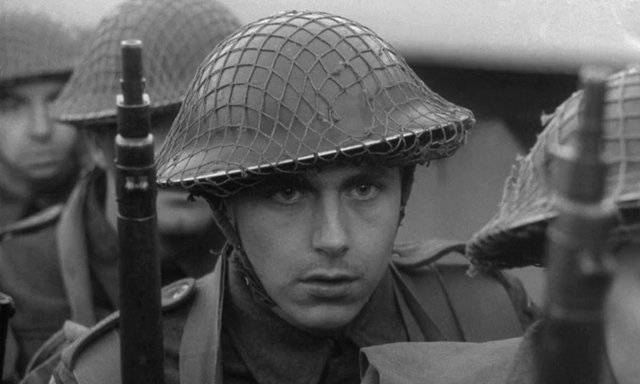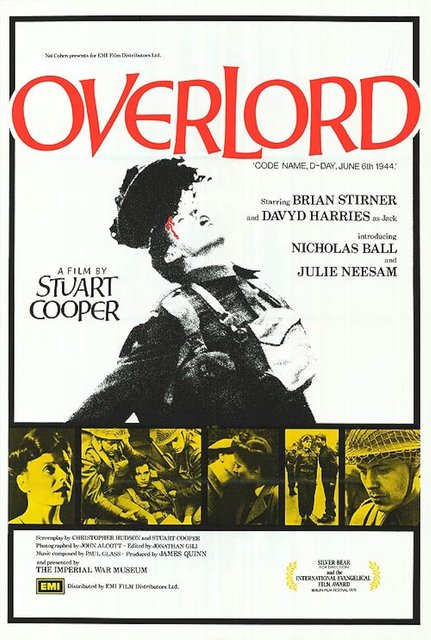
OVERLORD (1975)
Directed by : Stuart Cooper
Pan across the faces of soldiers waiting in a landing craft during an amphibious invasion these days, and I see boys - reminiscent of the "children's crusade" I first heard mentioned in a Kurt Vonnegut novel. Thomas Beddows (Brian Stirner) is not quite a boy, but not quite a man - he lives with his parents, and the love of his life happens to be the family Cocker Spaniel. Overlord is about Tom's journey from his front door, through basic training, and onwards to his appointment with destiny as Europe in the meantime is engulfed in flames during the Second World War. It's not your usual war film though, as around half of the footage we see is real, and was selected by filmmaker Stuart Cooper from the three thousand hours of footage he's said to have viewed in preparation for the making of this film. (Twenty-thousand feet of film are stored at the Imperial War Museum in London.) What's most surprising is how seamless the effect is - I was actually lulled during moments of the movie into a state where I wasn't quite sure where the more contemporary stuff ended and the WWII stuff began. To help with this effect, cinematographer John Alcott (of Kubrick film fame) used German lenses which had the right black and white look to achieve the right kind of balance.
We might expect Overlord to become a little impersonal, like many war documentaries are, but the narrative focus on Tom throughout really provides us with a human being at the center of the humungous military machine he's now a part of. Tom's story is what makes this a worthwhile endeavour because on some level an understanding is reached that there were millions upon millions of Toms, and our emotional connection with him brings the tragic nature of war into sharp focus - something that often fails to happen in movies dealing with war itself. The stock footage on the other hand gives us a sense of scale, organisation, ingenuity, effort and raw industrial output - the other side of war, which is often focused on to the exclusion of humanity, lest we lose enthusiasm for whichever war effort our country needs us to get behind. It's an interesting juxtaposition that gives Overlord a two-pronged effect, and it's all aided with a rather artistic, non-linear, dream-like approach to filmmaking, editing and storytelling. During Tom's journey he often dreams of his own death, and thus we see and share his anxieties, which he eventually simply comes to accept and be at peace with. Having watched him fall in love and start becoming an adult, we sure aren't at peace with this boy being killed - as we fear he will be.
Amazing to think that this came out in the mid-70s (it's easy to forget that while watching it, especially considering the way it's filmed - with the archival footage blending in so well with what was shot.) During this time anti-war feeling was at it's peak due to the conflict in Vietnam, and Overlord adds to the appreciation of how wasteful and terribly appalling modern warfare is, and how innocent young lives get chewed up by the monstrously gigantic machinery set in motion on an industrial scale. If we were to take a day to consider each soldier that died in World War II, we'd be spending around 55,000 years counting the cost, and if we were to spend a day considering each person, it would be nearly 165,000 years. Overlord gets us in touch with one such person, over the course of only 84 minutes. That's enough to make it hurt a little, and while we get to know him we see that in the meantime bombs continue to fall, cities burn, and civilians are captured on camera as charred remains - all someone's mother, daughter, son or father. Overlord is overdue some recognition and it's set to claim a place amongst the pantheon of great war films out there, the best of which are the likes of Paths of Glory, All Quiet on the Western Front, Come and See and The Cranes Are Flying.
Glad to catch this one - Criterion #382. It won the Silver Bear - Special Jury Prize at the 25th Berlin International Film Festival.

Watchlist Count : 433 (-17)
Next : Gifted (2017)
Next : Gifted (2017)
Thank you very much to whomever inspired me to watch Overlord
__________________
Remember - everything has an ending except hope, and sausages - they have two.
Latest Review : Before the Rain (1994)







